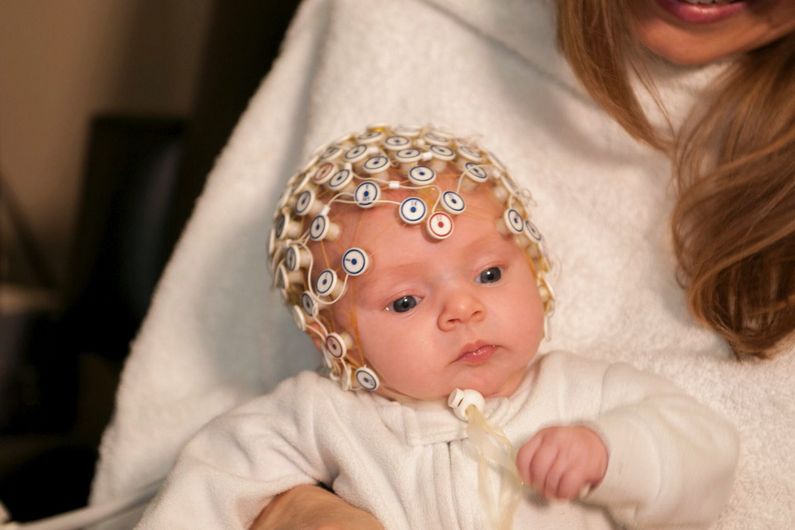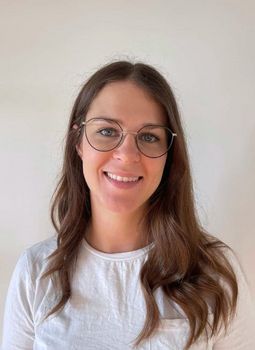Cognitive performance at age four can be predicted in infancy
- UdeMNouvelles
03/22/2024
- Martin LaSalle
Based on the brain dynamics she observed in infants, UdeM doctoral student of psychology Florence Deguire was able to determine which would go on to have the best adaptive behaviours scores.
Using electroencephalogram (EEG) data collected before the age of one, it is possible to predict which babies will have the highest adaptive behaviour scores at the age of four.
That's what Unversité de Montréal doctoral student of psychology Florence Deguire discovered in research conducted at the UdeM-affiliated CHU Sainte-Justine research centre, supervised by professor Sarah Lippé.
Deguire recruited 120 mothers who agreed for their newborns to take part in a 48-month longitudinal study. She first tested the infants’ ability to perform behavioural tasks, including posture, motor skills and language, at six months.
Then, each baby was fitted with a helmet equipped with EEG sensors.
“The babies watched a video in which a person said the same vowel for a while, occasionally interrupted by a different vowel, and we observed the babies' neurological response to the repetition and dissonance,” Lippé explained.
There were three follow-ups, at 18 months, 24 months and four years. Data was collected from the parents through a questionnaire and from the children in the lab through tasks that measured their ability to think and make connections.
EEG readings taken while these tasks were performed were also compiled.
Deguire’s results show that the neurological responses to repetition and dissonance in the first year of life are most predictive of cognitive and behavioural performance at age four.
“We found that in infants under a year old, brain activity spikes when they detect a deviating vowel because they’re so invested in the task,” Lippé said. “However, the deviating stimulus elicits less activity at age two, probably because their brains prefer greater complexity.”
The EEG was therefore able to detect the sensitivity of brain dynamics that are biomarkers of future developmental trajectories.
Specific indicators of disorders
The research team also found that in babies with atypical brain development, “there’s an alteration of the tasks and the electroencephalographic signal which are specific indicators of neurodevelopmental disorders that will occur later, although we can’t predict their progression,” said Lippé.
Deguire’s thesis project is part of a wider cross-sectoral research program in Lippé’s laboratory that is looking at both protective and interfering factors in children’s neurodevelopment in order to guide treatment pathways and educational plans.
Lippé’s research program on neurodevelopmental disorders such as intellectual disabilities and autism has identified brain signaling peculiarities in several genetic and idiopathic conditions and their links to cognitive and behavioural traits that significantly interfere with quality of life.
“My team is currently conducting a series of international clinical trials to investigate how these brain activity peculiarities can be improved with treatment,” she said.
Deguire’s work, for example, opens up the possibility of detecting neurodevelopmental abnormalities that are currently not diagnosed until age four or five.
“Florence’s results and our ongoing studies indicate that it is now possible to identify the alterations that can lead to sub-optimal trajectories,” Lippé said. “This will enable us to carry out more precise interventions with at-risk children and intervene earlier in their lives.”
Two of Sarah Lippé’s projects receive a total of $5.3 million in funding
Université de Montréal psychology professor Sarah Lippé is busy these days on two fronts.
Working with Dr. Emily Jones at Birkbeck, University of London, Lippé leads a project called “Genetics and Artificial Intelligence for Individualized Neural Stratification.” It aims to better understand the determinants of response to treatments, at the individual level, of children with autism or intellectual disabilities. The project is supported by $1.2 million in funding from the Simons Foundation Autism Research Initiative.
With Drs. Guillaume Dumas and Sébastien Jacquemont of UdeM’s Department of Pediatrics, Lippé also co-runs an international research project to identify the underlying mechanisms of sleep disorders in children with a specific mutation that puts them at risk for autism. Working with colleagues at Toronto’s SickKids Hospital, the University of California at San Diego, the University of California at Los Angeles and the University of Pennsylvania, the researchers will use a portable EEG device to collect sleep data from around 500 children in their homes. The project has received $4.1 million in funding from the Simons Foundation Autism Research Initiative.















